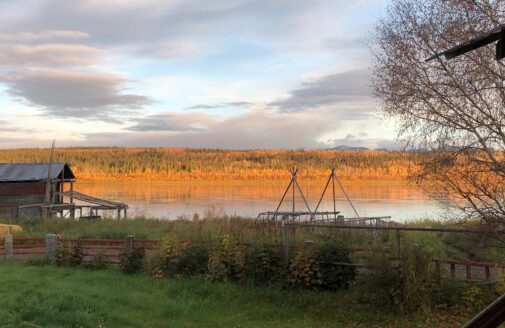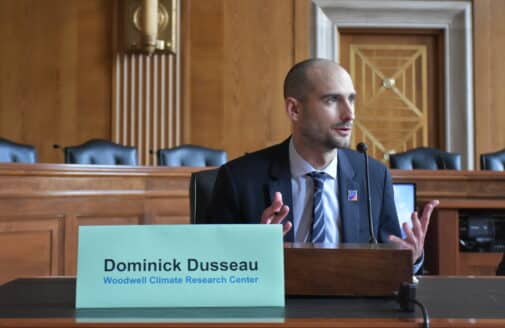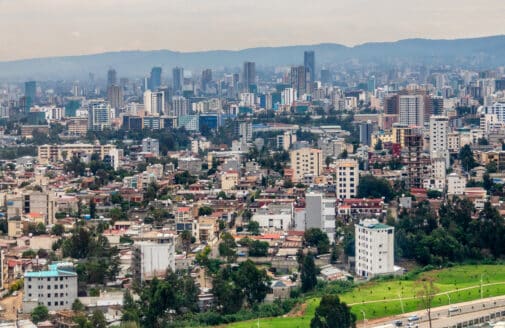Projet Équateur supports science-based economic growth in the DRC
Photo by Eva McNamara
As industrialization, deforestation, and wildfires continue to threaten the Amazon, tropical forests across the Atlantic sit at a critical development juncture. The Congo River Basin holds over a quarter of the globe’s remaining tropical forests, with approximately 60% of these forests, including naturally occurring old-growth forests, located within the Democratic Republic of the Congo (DRC)—one of the most resource-rich nations in the world. Woodwell Climate Research Center works cooperatively with key stakeholders to develop strategies to help the DRC meet its carbon emissions reduction commitments while fostering economic growth. That collaborative model has enabled work to advance during the pandemic, as local scientists and stakeholders have continued to carry out pilot programs and push for policy changes.
Photo by Eva McNamara
Unlike in the United States, where carbon-cutting measures largely focus on the energy and transportation sectors, policy to curb emissions in the DRC centers around reducing deforestation of primary intact tropical forest and restoration of degraded forest land. That puts national climate policy potentially at odds with local food production needs, as more than 98% of all deforestation in the DRC occurs as a result of slash-and-burn agricultural practices undertaken by small farmers. Hundreds of thousands of family farms currently operate under this model, consuming much of what they produce and selling slim surplus in loosely integrated markets. As a result, industrial policy practices and incentives common in other tropical regions, such as Brazil or Indonesia, are not effective in the DRC.
Instead, Woodwell Climate’s Projet Équateur, led by assistant scientist Dr. Glenn Bush, works on a local level to identify scalable strategies to improve net social welfare, creating incentives for forest conservation by meeting local farmer needs and introducing new agricultural techniques to increase economic activity.
To meet these goals, Projet Équateur combines research with policy engagement, partnering with a local college in Mbandaka, the Institut Superior de Developpement Rurale (ISDR), and the Botanical Garden of Eala (a national government facility) in the Équateur province. In this peat-rich region, Bush and team members investigate how to best manage lands that are already in use, provide technical agricultural training, and work alongside farmers to test more efficient production methods.
Traditional slash-and-burn methods require a substantial proportion of cultivated land to lie dormant for 7-15 years to regain fertility, but introducing the Velvet bean (mucuna pruriens) can dramatically decrease the length of the fallow period. The velvet bean provides a restorative cover of easily manageable vegetation that smothers weeds, shades and cools the soil, while also fixing nitrogen and shedding organic matter. This practice can boost production from cultivated land without the need to clear additional forest. Resulting agricultural surpluses can strengthen local markets with local produce to meet growing demand.
Projet Équateur has also experimented with cultivating community orchards to combat nutrition challenges. The village management of nutrient-rich fruit and nut trees can strengthen community bonds while improving nutritional health, as participation is widely accessible to all in the community.
Years of government instability have resulted in widespread economic insecurity and public health challenges within the DRC, forcing many citizens to continue to rely directly on forests to meet their primary income, health, and nutrition needs. Projet Équateur is aiding the regional transition from subsistence farming to a market-based economy by providing education and investing in community infrastructure such as school buildings and water points as directed by community leadership. These projects utilize Reducing Emissions from Deforestation and Forest Degradation (REDD+) funding, a U.N. carbon market mechanism. Program participants receive support for forest conservation efforts through direct payments for carbon emission reductions from changes to forest landscape management practices.
“We aim to empower communities by providing the education and infrastructure they ask for to make their own decisions about paths to sustainability,” Bush said. “When developing policy, we want to understand who are the winners, who are the losers, and how we can offset any losses in a fair and transparent way.”
Current Projet Équateur work focuses on scaling up discrete pilot infrastructure and agricultural projects to develop methods that can be scaled up and institutionalized across the country. The goal is to avoid further deforestation on community land by improving agriculture and rural livelihoods within an enforceable land use framework—effectively conserving forests without causing detriment to those living in the region. This work is informed by close collaboration with stakeholders, including private corporations looking to invest in land based enterprises e.g. agriculture and forestry in the region. Projet Équateur scientists and policy experts work alongside industrial agricultural concession cooperators to help identify approaches to improve their environmental and social performance and with organizations looking to buy and sell carbon credits. Bush and his team have also been studying power relationships and the representation of different stakeholders in land policy and management processes.
Due to close collaboration with local partners, Program Manager Joseph Zambo, and other national scientists, Projet Équateur has continued to operate under national public health guidelines through the COVID-19 pandemic. Although international scientists have been unable to travel to the DRC, local scientists and farmers continue to work on technological pilot programs and look towards institutionalization of these practices on the provincial level. Projet Équateur’s network of trusted local partners, developed over a decade of groundwork with officials from the provincial government, national ministry of the environment, university researchers, and community leaders have made this continuity and advancement possible.
“We often say environmental conservation is a luxury that only developed countries can really think about. But that’s not true. The people I’ve met on the ground in rural DRC are in touch with their environment because they have to be. As farmers, foragers, and entrepreneurs, they are directly immersed in nature and almost every aspect of In a modest way our science can have profound impact providing the knowledge and confidence for people to do what it takes to mitigate further climate change and adapt to some of its inevitable effects,” said Bush.
We aim to empower communities by providing the education and infrastructure they ask for to make their own decisions about paths to sustainability.Glenn K. Bush







